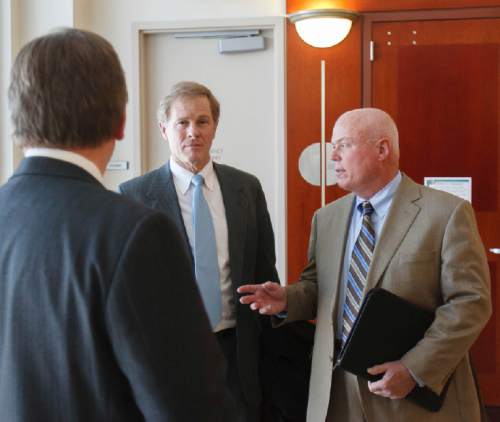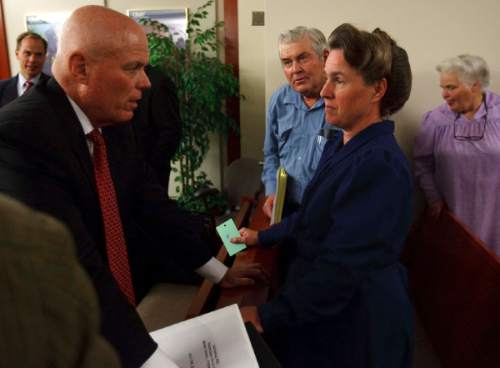This is an archived article that was published on sltrib.com in 2015, and information in the article may be outdated. It is provided only for personal research purposes and may not be reprinted.
The judge overseeing the polygamous trust managed by Utah has reduced the fees to be paid to attorneys and encouraged the trust to reduce its legal costs.
Judge Denise Lindberg, of Utah's 3rd District Court, reduced the fees by 5 percent in an order issued Thursday. The attorneys will be paid $842,051 for legal work during the first nine months of 2014.
Attorneys fees have become a contentious issue for the trust, called the United Effort Plan (UEP). In her written order, Lindberg said she was concerned by the sentiment of members of the Fundamentalist Church of Jesus Christ of Latter-Day Saints that "legal fees continue to be accrued at a very high rate."
She instructed the UEP to seek cheaper alternatives to the legal work while still safeguarding the trust's interests. Lindberg approved a plan to hire a Hildale, Utah, attorney who will bill at a lower rate than the Salt Lake City firm the trust has employed for a decade.
Lindberg also encouraged the fiduciary she appointed to manage the UEP, Bruce Wisan, to find other attorneys in the vicinity of Short Creek who could perform work at lower costs.
The UEP owns most of the homes and land in Hildale and adjacent Colorado City, Ariz., and residents there have complained about trust assets being used to pay what had been almost $100,000 a month in attorney fees.
Hildale and Colorado City, collectively known as Short Creek, is home to the FLDS.
Even people who no longer follow the church's leader, Warren Jeffs, have refused to pay a $100-a-month fee to live in UEP homes out of disdain for the legal bills.
The Utah attorney general's office, too, had expressed concern and asked Lindberg to reduce the attorney fees by 10 percent.
Lindberg said that was too drastic a reduction, but she also expressed concern that the UEP had multiple attorneys working on the same legal filings and attorneys billed for time they spent correcting their own billing errors.
Wisan and UEP attorneys have said that all the attorney hours are necessary because the trust is involved in multiple legal cases, sometimes as a defendant and sometimes as a plaintiff, seeking to protect the trust's assets.
In an annual report published earlier this month, Wisan described the unwillingness of Jeffs' followers to cooperate as creating legal work, such as evicting people who refuse to pay their fees and filing lawsuits against government entities in Short Creek.
In an interview last week, UEP attorney Jeffs Shields raised the possibility of taking Colorado City to federal court over its unwillingness to subdivide UEP property there.
Other items discussed in the UEP annual report:
• The finances are better than in previous years: But there's still not enough money to pay all the bills, including legal fees. The report discusses $2.2 million in property sold in 2014 and early 2015. That money helped pay off the loan the state of Utah issued the UEP.
The trust is collecting more of those $100-a-month occupancy fees, but the UEP says it was owed $4.9 million in fees at the end of 2014 — an increase of $760,834 from the year before.
The report also says the UEP continues to hear that some people loyal to Jeffs are submitting their fees to the FLDS with the assumption the church will forward payment to the UEP. That has not happened.
More people are paying their property taxes, too, the report says. Mohave County, Ariz., was owed about $2.1 million at the end of 2104. That's actually an improvement over previous years, the report says.
The taxes in Washington County, Utah, were "essentially current" at the end of the year, the report says. Taxes have been a recurring crisis for the UEP as properties have been days away from the auction block before the taxes have been paid.
• Policing problems persist: "There is still too much lawlessness in the communities, including trespassing, harassment, intimidation and the illegal occupation of homes and vacant land," the report says.
The report goes on to say that UEP employees inform the towns' marshals when they suspect crimes, and while the Short Creek marshals investigate, "seldom are there any tangible results."
The marshals' office told the UEP that it filed 97 cases with various prosecutors, but no charges were filed.
The marshals' behavior, including alleged alteration of police reports, is also an issue in the U.S. Department of Justice lawsuit against the towns for alleged religious discrimination.
• FLDS members still don't want to cooperate: Beyond the occupancy fees, issues with the marshals, and Colorado City not wanting to subdivide parcels, the report describes the general obstacles posed by Jeffs followers who don't want to or can't work with the UEP.
"The fiduciary has been told by individuals that have left the FLDS religion that the FLDS leaders have forbidden its members to work with the trust," the report says. "Anyone working with the trust will apparently lose their membership in the FLDS Church."
Twitter: @natecarlisle





